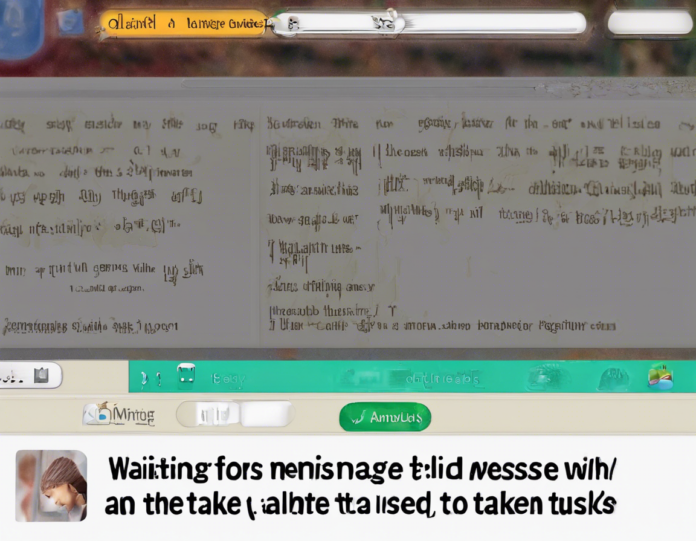In today’s fast-paced world, instant communication has become the norm. With the click of a button, we can send messages to anyone, anywhere in the world, and expect a response almost immediately. But what happens when that response doesn’t come right away? The waiting game for messages can sometimes be challenging, frustrating, and even anxiety-inducing. In this blog post, we will delve into the art of patience when it comes to waiting for messages, exploring why it’s important to wait, how to manage the waiting period, and the psychological factors at play.
Why Waiting for Messages Is Important
In a world where instant gratification is highly valued, waiting for messages can feel like an eternity. However, it is crucial to understand that people have their own lives, schedules, and priorities. They may not be able to respond to messages immediately, even if they want to. It’s essential to respect others’ time and boundaries and practice patience when waiting for a response.
Moreover, allowing time for reflection before responding can lead to better communication and more thoughtful interactions. Rushing a response just for the sake of a quick reply can lead to misunderstandings, miscommunications, and even conflicts. Patience in waiting allows for more considered and meaningful conversations.
Managing the Waiting Period
While waiting for a message can be challenging, there are several strategies to help manage the waiting period effectively:
1. Distract Yourself
Engage in activities that bring you joy and keep your mind occupied while you wait. This could be reading a book, going for a walk, practicing mindfulness, or pursuing a hobby.
2. Set Expectations
Communicate your expectations regarding response times with the other person if possible. Setting clear boundaries can help manage your own expectations and reduce anxiety while waiting.
3. Practice Mindfulness
Stay present and mindful of your thoughts and feelings while waiting for a message. Practice deep breathing, meditation, or relaxation techniques to stay calm and centered.
4. Limit Screen Time
Obsessively checking your phone or inbox can increase anxiety and prolong the waiting period. Set specific times to check for messages to avoid becoming consumed by anticipation.
5. Focus on Self-Care
Engage in self-care strategies such as exercise, healthy eating, sufficient sleep, and socializing with loved ones to maintain your well-being while waiting.
The Psychology of Waiting
The act of waiting for a message can evoke a range of emotions and psychological responses. Understanding the psychology behind waiting can help us navigate this experience more effectively:
1. Uncertainty
Waiting introduces uncertainty into our lives, triggering feelings of anxiety and discomfort. Our brains seek closure and resolution, making uncertainty a challenging state to tolerate.
2. Control
Waiting diminishes our sense of control over a situation, leading to feelings of helplessness and frustration. Accepting uncertainty and relinquishing control can help reduce these negative emotions.
3. Expectations
Unmet expectations regarding response times can lead to disappointment and resentment. It’s essential to manage your expectations and practice empathy towards the other person’s circumstances.
4. Perception of Time
The passage of time can feel distorted while waiting for a message, with minutes feeling like hours and hours feeling like days. Engaging in meaningful activities can help alleviate this distortion and make the time pass more quickly.
FAQs (Frequently Asked Questions)
1. Why do some people take so long to respond to messages?
People have varying priorities and commitments that may prevent them from responding immediately. It’s important to respect their time and understand that prompt responses may not always be possible.
2. How long should I wait before following up on a message?
It’s appropriate to wait 24-48 hours before following up on a message, depending on the urgency of the communication. If it’s time-sensitive, consider reaching out sooner.
3. What if someone never responds to my message?
If someone consistently fails to respond to your messages, it may be a sign that they are not interested in engaging with you. It’s important to respect their boundaries and focus on connections that are reciprocated.
4. How can I avoid feeling anxious while waiting for a message?
Practicing self-care, setting boundaries, and engaging in mindfulness activities can help reduce anxiety while waiting for a message. Focus on activities that bring you joy and fulfillment.
5. Is it rude to take a long time to respond to messages?
While prompt responses are generally appreciated, it’s essential to prioritize your well-being and responsibilities. Communicate openly with others about your response times to manage expectations effectively.
In conclusion, waiting for messages is an inevitable part of modern communication. By cultivating patience, managing the waiting period effectively, and understanding the psychology behind waiting, we can navigate this experience with grace and resilience. Remember, good things come to those who wait – including messages.









